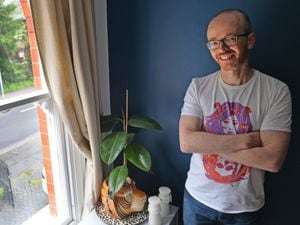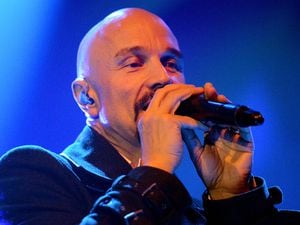Garry Thompson’s ‘lucky’ life in the beautiful game
All-action hero Garry Thompson reflects on the making of his fascinating footballing career – and wouldn’t change a single thing.
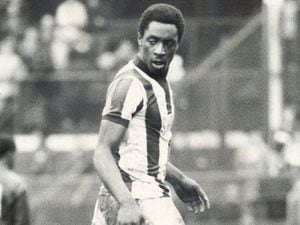
Don’t meet your heroes – that’s what the man says. Except Garry Thompson did. During 15 of the best months of his career, he partnered the great Cyrille Regis at West Bromwich Albion. The big man, incidentally, exceeded expectation. Nurturing the sometimes-aggressive Thompson through games, they struck up a rapport on and off the pitch.
As Thompson himself became a Baggies legend, scoring 39 goals in 91 appearances, he also became firm friends with Cyrille. It was the making of him. In a much-travelled career, both as player, coach and manager, the golden era he enjoyed at the Hawthorns continues to stand out. He looks back on 1983 to 1985 with nothing but fondness.
“I was very fortunate. I played in a good side at Coventry City with people like Terry Yorath. But West Brom had the finest players, people like Derek Statham, Cyrille Regis, Brendan Batson and then Steve Hunt. They were good, good players.”
A tall, quick, muscular centre forward, West Brom’s skillful playmakers suited Thompson’s style of play. “They played a good brand of football. I scored an awful lot of goals but the big fella, Cyrille, took so much weight off my shoulders. He was like the Cadbury rabbit, chill man, why are you trying to fight? So he was nurturing me through games all the time.”
The two men got on well on and off the pitch. Thompson had watched admiringly from Coventry when Cyrille, Laurie Cunningham and Brendan Batson became the much-lauded Three Degrees. “Me and Cyrille got on well on and off the pitch. He taught me how to drink. When I was at Coventry, I remember thinking Cyrille was class. I felt lucky to play with him for 15 months.
“All through my life, I’ve been lucky. There were good mentors and managers like Ron Wylie, Gordon Milne and Terry Yorath at Coventry. Then, by the time I got to the Albion, I was playing with my hero, Cyrille. He didn’t disappoint. I’d go out for drinks. It was brilliant. They sold him to Coventry and I was gutted because he was one of the best from that modern era. He had time for me.
“Coventry’s objective was just to stay in the top league. West Brom had been in Europe and they were known for their free-flowing football. The expectation for them was to get into Europe. I look at that squad and we should have been around Europe.” But they were too hit and miss. “Johnny Giles came in and I played my best football and scored the most goals. This is the advice I’d give to any striker in the modern era. If you’re in a place you’re comfortable, don’t run off to get money. Stay and score your goals and become a hero.” Thompson did, for a couple of years. His hero status remains.
Thompson reflects on those years – his years at Aston Villa, Coventry, Crystal Palace and elsewhere – in his fascinating new autobiography. Don’t Believe A Word was written with the respected sports journalist, Bill Howell.
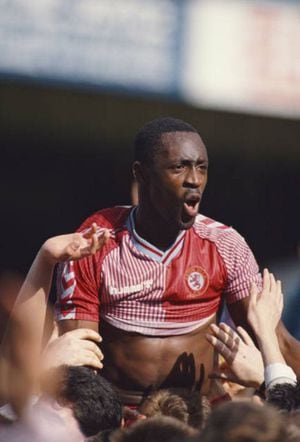
A Brummie by birth but raised in Coventry, Thompson burst onto the footballing scene at a time when Britain’s pioneering black footballers had to fight against some appalling racial abuse from the terraces. At a time when Cyrille Regis and Laurie Cunningham were seen as true trailblazers down the road in West Bromwich, Thommo was turning just as many heads with goals aplenty for the Sky Blues.
But it wasn’t just his scoring exploits that caught the eye. Thompson’s swashbuckling, all-action style combined tenacity, power and aggression, with an ability to hang in the air and an eye-catching trademark look of socks rolled firmly down around his ankles.
‘Bruno’, as many tagged him, enjoyed three goal-laded years at Albion before a record-breaking move to high-flying Sheffield Wednesday and then to boyhood club Aston Villa, which saw him become an iconic figure in his own right after he spearheaded a promotion campaign under Graham Taylor.
There followed a brief stint at Watford, before he returned to the top flight with Crystal Palace and to QPR in the newly formed Premier League, helping strike partners Ian Wright and then Les Ferdinand become the legends that they undoubtedly became in the game.
Thompson’s later career saw transfers to Cardiff City and to Northampton Town before a swansong into management at Bristol Rovers and Brentford.
But his tale is far more than just a simple football almanac. Thompson’s life tells the story of a larger-than-life character who wholeheartedly rejoiced in the on-field exploits of his team-mates and clubs but whose joy turned to heart-breaking despair with the loss of a brother, a wife and a number of team-mates just when life seemed so darned good.
Thompson epitomised everything that was right about the game in the late 1970s, the 1980s and the 1990s. Now a well-loved pundit on the BBC, his life is likely to leave a legacy long after his infectious smile has gone.
Funny, then, that he didn’t think of himself as being particularly good. “I wasn’t,” he deadpans. “Not as a kid.”
Two of his brothers played football while his sister was an international runner, at Birchfield Harriers. “I didn’t get into football until I was 7 or 8. My brothers wouldn’t let me get involved so I went and cried to my mum.” They let him join in, after that, and playing with older kids helped him to improve. He was from sporting stock, in any event. His father was an athlete who had prospered in St Kitts and Nevis while his mother was an exceptional tennis players. His nephew, Daniel Caines, finished fifth at the Sydney Olympics and won numerous medals at other championships.
“We were just sporty. Anything with a competitive edge and I was having it.”
Football was at the centre of his life every day. “On the way to school we’d have a ball. We’d have a ball from the paper shop that would fly all over the place, one of those lightweight things. We’d dribble that all the way to school.
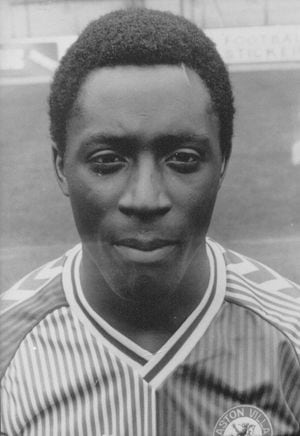
“When we’d get to school, we’d have a game at school, then we’d have assembly and there’d be two 10 or 15 minute breaks during the school day, so we’d play football then. At lunch, we’d wolf our food down and then go and play football. Then after school, we’d go onto the playing fields over the back. They say if you get 10,000 hours in at anything, you become half decent.” Thompson had done that by the time he left school.
He’d neck his dandelion and burdock at King’s Heath Park and then terrorise defenders. He got his break when one of his mates, Paul Dyson, was picked up by Coventry. “There were three of us. Me, Paul and Malcolm Percival. Paul was at Coventry and they asked him if he knew anyone decent, so he recommended me and Percy. Percy went and did two days and couldn’t stand the discipline so he went home.” Thompson, in contrast, loved it.
“I was only a young kid. I went to Coventry at the end of the summer holidays. Jimmy Hill was their chairman. He played in the notoriously competitive Central League, visiting Anfield, Goodison Parkand other First Division grounds to play established reserve teams. “I’m lucky they took me on. There was no Plan B. These days, people talk about first team players not wanting to play in the reserves but it was different back in the 1970s. We were playing against the likes of Tommy Smith, at Liverpool. He booted me all over the place so I went and stood on the left wing. The senior players would play, they’d help us develop our game.”
Thompson got close to the first team and believed he was due a debut when Coventry’s striker, Mick Ferguson, was injured. “We were playing Spurs. I’d been scoring in the reserves and I thought it was my chance.” Thompson found out he hadn’t been selected and started mouthing off to other players. He didn’t realise, his manager, Gordon Milne, and assistant, Ron Wylie, were within earshot. “The other players were egging me on, then I realised why.”
“They hauled me into the gaffer’s office and Ron Wylie was circling behind me, telling Gordon I thought I should be picking the team. I was scared to death because my mouth had run away with me. In the end, Gordon said he didn’t want me to play at Spurs for my debut.” But they did say he could play against the Villa a few days later at Highfield Road. “Then they told me to get out of the office.”
He suffered a spate of injuries in the early days. In one of his first matches, he got smashed between a goalkeeper and defender at Norwich. “I got between the keeper and centre forward. I got smashed. I got injured. They jabbed me up and I played until Fergie came back.”
He went on tour to Japan and came back in good shape, as the England Under-21 squad came sniffing. Then he suffered a broken leg. “I’d been called up for the under-21s the week I broke it.” A Liverpool lad, on trial, had clattered him and Thompson passed out. “When I came round, they told me not to look at me leg.” He ignored the advice and looked, promptly passing out again. I broke it in three places. Initially they were going to put pins in it but the doctor decided not to. That decision saved my career. If they’d pinned it, it would have been all over.”
Thompson prospered. In 1980 and 1981 he played more than 40 games per season, scoring 15 goals in both. Leeds came in for him, as did Arsensal, but Coventry refused to sell. Then the club ran into financial difficulties and cashed in, selling him to West Brom.
“Jimmy Hill called me and told me if I didn’t go they’d be bankrupt within six weeks. Albion had beaten us 7-1 a few seasons before and people like Ally Robertson, John Wile, Martin Bennett and Remi Moses all used to kick lumps out of me when we played them. Ron Wylie was instrumental in the move, he bullied me into it.”
It may not have been an auspicious start, but Thompson prospered, particularly playing alongside Big Cyrille. In 1983, he was the top scorer, playing in 45 matches, the year after he played in 48 and netted 22 goals.
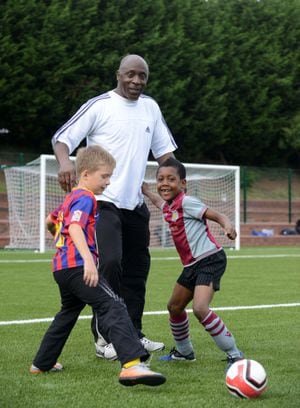
“I scored a hat-trick against Forest. After the game Brian Clough snatched the matchball away from me - I’m not going to argue with the great Brian Clough: if wants the ball, he can have it. Then, a few minutes later, our dressing room door opened and in walked Clough with the ball signed by all of his players and he told our lads to sign it too. That ball ended up with my dad who told me off for trying to chip the keeper for the third goal. Charming.”
The big clubs came in for him and he was called into see the manager. On the morning of the meeting, the newspapers were reporting that Arsenal had tabled a £400,000 bid. For all of his goals, Thompson was the second lowest paid player at West Brom. A move to Switzerland was tabled and the money would have set him up for life. Chelsea and Villa were also hovering. However, that fell through and Thompson ended up at Sheffield Wednesday.
He did okay, then his boss, Howard Wilkinson, decided to sell him to Villa. “Gary Shaw told me I was three years too late and everything spiralled from there. As a club, it was not the club I envisaged it to be. They’d tried to sign me three times.” Villa were relegated in 1986, though came back up the following year; the rollercoaster of professional sport.
There were further moves: Watford and a happy stint at Crystal Palace, then a couple of years at QPR before stints at Cardiff and Northampton. He decided to call it a day when he got into a touchline brawl with Alvin Martin. “I decided that was me done. Basically, I was finished. I didn’t want to be doing that.”
They kept Thompson on to teach the kids and he was a natural, a brilliant, empathetic coach who brought the best out of people by applying rigorous discipline with an understanding ear. “When I was a kid, the managers would bully you. Players won’t stand for that now. You have to have a coach that you want to work for.” Thompson was that coach.
He managed Bristol Rovers then briefly Brentford, though the experience was challenging. He resented the interference from board members, who were constantly in his ear telling him which team to pick. Gradually, he drifted out of the game. His knees were shot, so he couldn’t coach. Though he was fascinated by management, he couldn’t stand the interference.
He’s proud of what he achieved. He played for his boyhood club, Villa. Their relegation was the worst low, their promotion the highest high.The whole experience was brilliant. My worst days were better than most people’s good days.”
He enjoyed working with Bill Howell on his book. “He’d been on at me for 10 years to do it. He caught me off guard and I agreed. With the death of my parents and Cyrille, it was cathartic. He did a great job, turning the ramblings of an old man into a decent story.”
Now a BBC WM commentator, Thompson’s is more than a decent story. Following Batson, Regis and Cunningham at West Brom, he became a role model who helped to eradicate the worst excesses of racism from local grounds. “Those guys made a difference. It gave so many black kids of that era that chance. We put up with a lot of stuff that kids nowadays won’t stand. They dominate the situation and say enough. They won’t have it. We’ve got opportunities for players. Now we’ve got to get the same opportunities at boardroom level and management level. There are very, very intelligent people who deserve opportunities.”
His grandkids make fun of him because he shuffles from time to time; the result of playing through so many injuries. Not that he’d change it. “I’m proud of those playing days. I wouldn’t change a thing.” And nor would the legions of fans who still consider him a hero.
* Garry Thompson’s book, Don’t Believe A Word, is available, priced £17.99, from https://www.curtis-sport.com/



